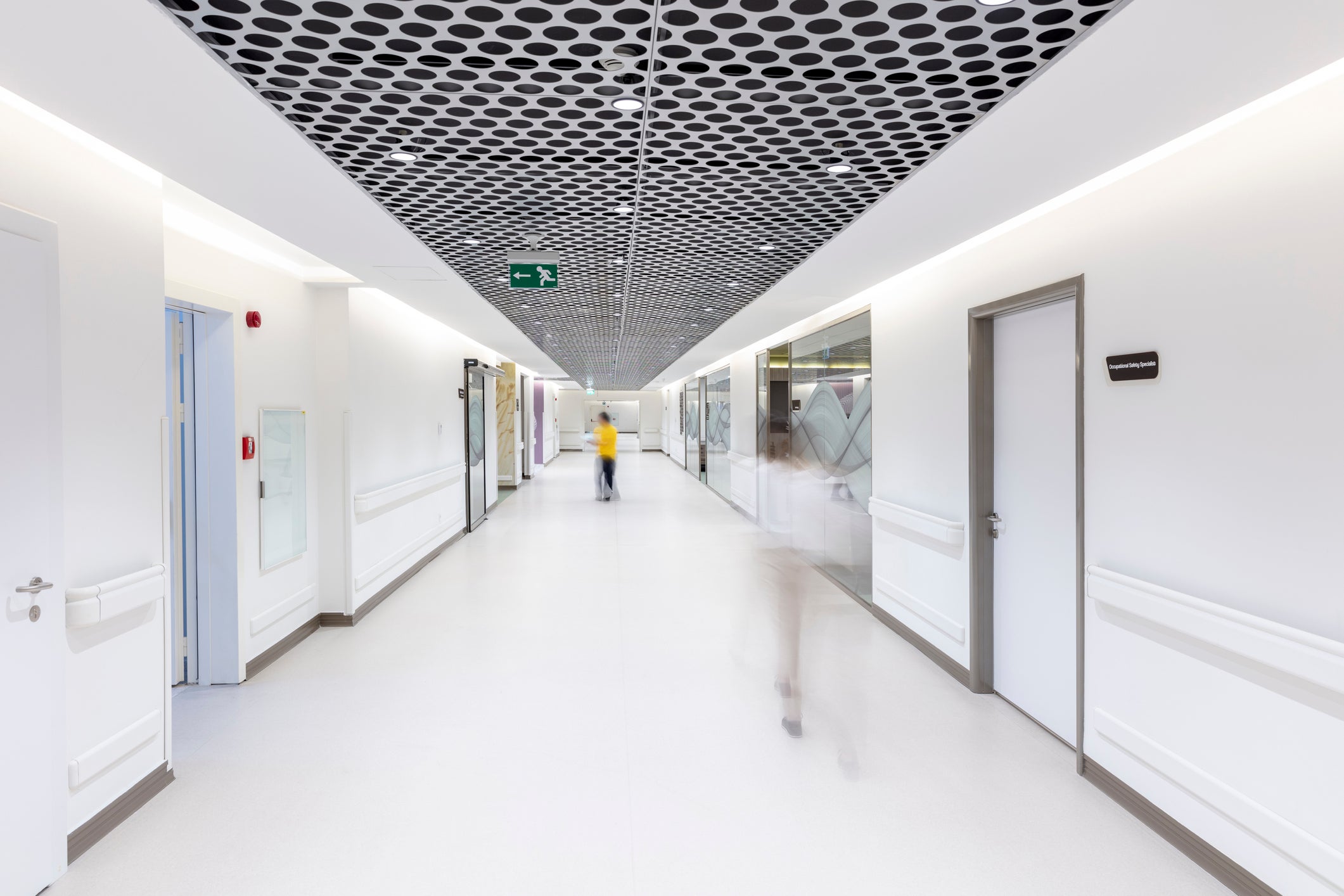
Soon before his scandal-ridden departure from British politics, the then-health and social care secretary Matt Hancock announced a draft strategy to support delivery of patient centred care through NHS England, one which may deliver a greater pathway for a smart hospital revolution.
Titled Data Saves Lives: Reshaping health and social care with data, the strategy, in Hancock’s words, “seeks to put people in control of their own data” and proposes “a new duty to share anonymous data safely and appropriately across the entire health system…(which) could improve the commissioning and planning of services.”

Discover B2B Marketing That Performs
Combine business intelligence and editorial excellence to reach engaged professionals across 36 leading media platforms.
The draft strategy – from a politico who has since been forced to resign because of an office fling caught on film by seemingly hidden cameras – is likely to influence the NHS through both digital and physical infrastructure. This is especially true if the government’s somewhat ambiguous plan to build 40-odd new hospitals by 2030 turn out to be a serious one. This ambition of the healthcare service ties in with a global rise in the utilisation of smart solutions in the hospital space.
“As the elderly population continues to rise and the need for healthcare continues to increase, smart solutions can help reduce healthcare costs, increase efficiency, and lift some of the burdens off of healthcare staff while improving patient health outcomes at the same time,” as GlobalData analysts state in a recent smart hospitals report.
With these goals in a basis, the NHS plan has already informed the new Princess Alexandra Hospital being planned for construction in Harlow, Essex, a £600m project for which Gemserv Health undertook the hospital’s digital planning.

US Tariffs are shifting - will you react or anticipate?
Don’t let policy changes catch you off guard. Stay proactive with real-time data and expert analysis.
By GlobalDataSpeaking with Verdict, managing consultant at Gemserv Health Mike Entwistle says the hospital is “likely to conform to the NHS’ vision that technology should be used to drive clinical improvements and give patients more control over their health data.”
“The new Princess Alexandra Hospital has been earmarked as one of the health infrastructure plan’s hospitals for major investment and this investment is in the form of a brand new hospital campus and associated technology,” adds Entwistle.
While it’s too soon in development stages for Entwistle to reveal what exactly makes the Princess Alexandra a smart hospital, he does say it will be investing in a “broad range of the technologies that are contained in the government’s health infrastructure plan.”
A clue as to what these may be can be found in the NHS strategy, which highlights artificial intelligence and 5G technology use by University Hospitals Birmingham.
Birmingham will also see Midland Metropolitan University Hospital (MMUH) open in 2022, replete with smart energy solutions and an open internet of things system provided by Schneider to the tune of almost £1bn.
Projects like the MMUH though have, like others of its kind in England, been hit with delays and ballooning budgets, making perhaps for another peck on the Hancock legacy. The minister’s stint in power was a turbulent one, marked by accusations of Covid mishandling, a controversial post-pandemic pay rise for English NHS workers and plans to place GP records on a centralised database in what was seen as a cynical data grab.
But the strategy left behind by the minister for his successor may one day be seen a high note of his career. As industry experts tell Verdict, it would be a rather smart idea for smarter hospitals to be taken seriously and transplanted into the body of the nation.
Why smart hospitals are needed
For Jon Payne, manager of sales engineering at data tech provider InterSystems, the smart hospital provides a chance for systems in UK and Ireland to bring data together in one central place.
“Systems integration is one of the cornerstones of smart building technology today and demonstrates the small, calculated steps that hospitals can take now to ensure their day-to-day operations work smarter,” Payne says.
“This can be achieved using a single interoperability platform, enabling all systems within hospitals to be centrally controlled and connected. Such a platform could drastically improve the ways in which hospitals are run, supporting with everything from streamlining patient admissions, to tracking and managing food waste and patient medicines.
“Beyond the walls of the hospital, interoperability platforms also have the potential to boost the benefits of at-home devices by extending the reach of integration from the home directly into the hospital.”
Payne stresses that it’s important that those developing and implementing such technologies acknowledge the need “to ensure these systems are able to ‘talk’ to one other to avoid the possibility of siloed information and a disjointed healthcare service.”
“We don’t necessarily need Alexa-style devices; what’s important is that systems are talking to each other,” says Kees Wesdorp, CEO of Precision Diagnosis part at Philips. “There is no shortage of data, and we need to harness the power of this information to provide a more direct path through diagnosis and treatment.”
“We can do this by combining the power of imaging, monitoring, laboratory, genomics and longitudinal data with insights from artificial intelligence that puts the patient at the centre. This will drive the right care, in the right sequence, at the right time.”
 Kees Wesdorp, CEO of Precision Diagnosis part at Philips
Kees Wesdorp, CEO of Precision Diagnosis part at Philips
A smarter 2020s after Covid-19
Wesdorp gives Verdict a global view on the smart hospital and why the pandemic will likely accelerate the need for more tech in healthcare.
“The need for smart systems is even more important in the wake of Covid-19, as hospitals face a backlog of patients, delayed tests and treatment,” he says. “This struggle to manage capacity, of getting patients to the right places, arranging the right tests and triaging them through the system, while avoiding staff burnout, is a pressing challenge for the NHS and healthcare systems around the world.”
For Wesdorp, this backlog can be cleared by digitising patient flow, enabling interoperability between devices and allowing for real time analysis and reporting so medical staff can react to and assess patient need in the moment.
“Smart hospitals can improve healthcare for both staff and patients by speeding up the planning, scanning and processing of examinations.”
Examples of new hospitals around the world that come powered by tech include Canada’s Cortellucci Vaughan Hospital, which opened in late 2020. Staff, systems and devices are all connected and mobile in the hospital, while smart beds monitor patients around the clock, ready to sound the alarm at a moment’s notice if needed.
Calvary Adelaide Hospital in Australia also opened in late 2020, boasting automated lighting and monitoring with expected energy savings of up to 60%. Dubai’s Fakeeh University Hospital meanwhile comes with tablets in patient rooms and an app that allows for around-the-clock service.
But besides an investment in infrastructure there also needs to be an investment in professional education, Wesdorp notes. In a survey from the Future of Humanity Institute, 40% of surveyed healthcare leaders said a lack of interoperability or data standards across technological systems and platforms is hindering progress. 36% said lack of training on how to fully utilize digital health technology is an issue.
“So the implementation of smart technology is very important, along with the training of staff to support it.”
“There’s also an increasing focus on integrating data from multiple departments, such as oncology, radiology and pathology: The goal is to simplify data and insight gathering, drive targeted treatment and outcomes, remove excess costs, and provide a better experience for patients and staff.”
Smart hospitals on the rise
Perhaps then, data can truly save lives in smart hospitals. They may even be the healthcare legacy that Hancock leaves behind for England. Or at least he may hope so, given his tenure as health secretary has been mostly lined by failures.
His time at the helm was filled by data privacy and digital endeavours that verged on the disastrous: faulty Covid tracking apps, the so-called GP data grab from earlier this summer. Even the circumstances that led to his departure from the position of health and social care secretary showed how some matters, even if not health-related, are hard to keep private in a digital world, no matter how much one would wish they were otherwise.
Hancock’s time at the helm was filled by data privacy and digital endeavours that verged on the disastrous.
Arguably though, this is the cautionary tale one should expect when trying to modernise a 73-year-old public institution. As senior GlobalData analyst David Brown believes, the pandemic may have left no other options on the table, but there are better ways of augmenting the NHS in trend with the global smart hospital theme.
“Digital-enabled and smart hospitals could indeed be the legacy of Matt Hancock,” Brown tells Verdict. “He’s been a driving force behind a lot of digital-capability pushes, but he’s also a staunch backer of the GP patient data grab. This was largely viewed as the wrong way to push the UK into the true digital age. It undermined a lot of public trust by auto-opting individuals into the program without even informing them in a serious way.
“The post-Covid world is a huge pressure on healthcare systems around the world to operate in less siloed, more digitally enabled and flexible fashions. A good parallel here is to look at the early days of Google and Facebook.
“Folks loved their services and didn’t really understand the dangers of sharing data online. Now these corporate giants know almost everything that we do (and) use this largely for advertising and for psychological manipulation to keep their platforms addicting. Imagine if this mode of operating entered the healthcare space? It would be an absolute disaster.
“The UK stepping forward on its digitalisation efforts could be a net-positive result in the long term as any country taking serious strides towards operating more digitally will enable better care options. But how you get there definitely matters.”
By Verdict’s Giacomo Lee. Find the GlobalData Smart Hospitals – Thematic Research report here.




